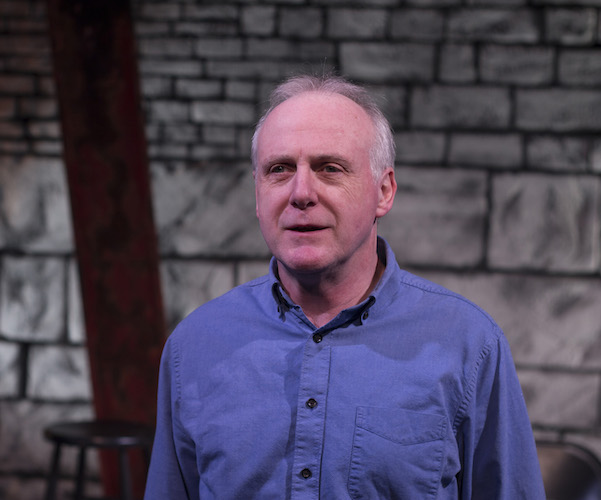Fuse Theater Review: “Via Dolorosa” — An Innocent Abroad in Israel
Via Dolorosa is essentially a work of reportage: it would have been more effective if it had taken the form of a travel essay rather than a performance piece.
Via Dolorosa by David Hare. Performed by David Bryan Jackson. Staged by the New Repertory Theatre in the Black Box Theater at the Arsenal Center for the Arts, Watertown, MA, through January 31.

David Bryan Jackson in “Via Dolorosa.” Photo: Katharine Burkhart / Katharine Burkhart Designs.
By Robert Israel
Via Dolorosa – it translates as “Way of Grief” – is an artery that wends through the Old City of Jerusalem. Its cobblestones and thick stonewalls have been witness to much grief during numerous conflicts over the millennia. Built by the Romans who conquered and occupied Jerusalem in 63 B.C., you enter Via Dolorosa from the Damascus Gate, or by joining it from another Roman artery, the Cardo. You pass by Jewish and Arab residences, places of worship, and shopkeepers in shouks selling gewgaws, falafel, and potions.
When visiting Via Dolorosa, as I did years ago, you also come upon pilgrims and tourists, cameras in hand, who stand before the way’s fourteen Stations of the Cross in wide-eyed wonderment. The Stations are places where Jesus reportedly experienced extreme suffering and humiliation before arriving at his crucifixion at Calgary. This location becomes a metaphor for much of what playwright Sir David Hare experienced during his brief 1997 sojourn in Israel. Hare wrote Via Dolorosa when he returned to the U.K., later performing the world premiere production of this ninety minute monologue. The New Repertory Theatre Company features the highly polished actor David Bryan Jackson sharing dramatist’s vivid impressions of the roughly two dozen characters he encountered in his pilgrimage.
And while several of Hare’s impressions moved me, I was left with the feeling that Via Dolorosa, essentially a work of reportage, would have been more effective if it had taken the form of a travel essay rather than a performance piece. While Hare’s writing here is often arresting – he describes one person he meets as having “eyes as dark as caviar” – the monologue struggles to maintain any vibrance as theater. The veteran dramatist tries, in vain, to capture the essences of far too many characters, each of whom carries a distinctively heavy burden of personal and collective history on his or her shoulders. The various personae tend to blend together rather than square off dramatically, despite Jackson’s intensely articulate performance.
Two people we are able to focus on – Hare allots considerable time describing his encounter with them — are Danny and Sarah Weiss, the parents of six children who live in an Orthodox Jewish settlement on the West Bank. While he does not describe in detail the workings of this settlement and the couple’s role in this collective community, we learn that the Weiss’ motivations for choosing this desolate place in the Hebron foothills is to reclaim what they feel is rightfully theirs. These people are convinced, as we say in Yiddish, that their place there is gescribben, or so written. “The Lord promises us this land,” Sarah tells Hare, citing a Biblical reference to ownership. During a solitary nighttime walk with Sarah, filled with lapses into silence, the playwright listens to Sarah’s repeated intoning of this tenuous Biblical entitlement, and her intention to stay no matter what the cost.
Palestinian residents of Gaza share a similar sense of entitlement to the land they are struggling to call their own. In their encounters with Hare, the land is a described as a desolate, barren place where poverty and despair breed contempt and violence. Since the play is set in the late 1990s, there are frequent mentions of the late Palestinian leader Yasser Arafat who, along with Israel’s leader, the late Yitzchak Rabin, cobbled together a fragile peace accord, fostered by then-President Bill Clinton. These references provide an ironic context for the problems of present-day Israel, which continues to be surrounded by hostile neighbors who daily commit acts of wanton violence.
Toward the end of the play, Hare shares with the audience that, in his final encounters, he has learned to avoid using “trigger words” in his conversations, words like “Rabin” and “Bible.” He has observed that the lessons of the past are only skin deep in Israel, where the shock of the new is more intense than its sense of history, and often more horrific. He cannot come to terms with what he discovers in Israel, perhaps because of his left-wing British sensibility — he can’t understand the inequities of those who have (Israelis) versus those who have-not (Palestinians). He is very much a self-professed “innocent abroad”; he returns to the safety of his home in London overwhelmed by agonizing impressions, to the point of being obsessed. Ultimately, what he has witnessed is a land where all bets are off.
The last scene – actor David Bryan Jackson stands in his London home haunted, in shadows, intoning the name of Via Dolorosa – is perhaps the most telling. The Middle East is that kind of place, and the best that we can do is listen to the outbursts of its people and try to come to terms with their struggles, which are well beyond what one mind can encompass on stage.
Robert Israel writes about theater, travel, and the arts, and is a member of Independent Reviewers of New England (IRNE). He can be reached at risrael_97@yahoo.com.
Tagged: David Bryan Jackson, David Hare, Israel, New Repertory Theatre, politics

